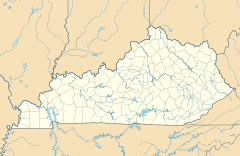Tuckertown, Kentucky facts for kids
Quick facts for kids
Tuckertown
|
|
|---|---|
| Country | United States |
| State | Kentucky |
| County | Warren |
| Elevation | 564 ft (172 m) |
| Time zone | UTC-6 (Central (CST)) |
| • Summer (DST) | UTC-5 (CST) |
| GNIS feature ID | 509241 |
Tuckertown is a small place in Warren County, Kentucky, in the United States. It's known as an unincorporated community. This means it doesn't have its own local city government, like a mayor or city council. Instead, the county government helps manage things for the people living there.
Contents
What is an Unincorporated Community?
An unincorporated community is a group of homes and businesses that are not part of an official city or town. People who live in Tuckertown get their services, like roads and police, from Warren County. This is different from living in a city, where you might have a local mayor or city council.
How Unincorporated Areas Work
In an unincorporated area, the county government handles many tasks. These tasks include maintaining roads, providing emergency services, and managing local rules. This setup can mean fewer local taxes for residents. It also means decisions are made at a broader county level.
Where is Tuckertown Located?
Tuckertown is found in Warren County, Kentucky. Kentucky is a state in the southeastern part of the United States. Warren County is known for its beautiful landscapes and friendly communities.
Exploring Warren County
Warren County is home to many interesting places. It has a mix of rural areas and larger towns. The county seat, which is like the main city, is Bowling Green. This city is much larger than Tuckertown. It offers more services and activities.
Life in Tuckertown
Life in an unincorporated community like Tuckertown is often quieter. It might feel more like a rural area. Residents often enjoy a close-knit community feel. They rely on the county for most public services.
Community and Services
Even without a city government, communities like Tuckertown thrive. Neighbors often help each other out. For bigger needs, residents travel to nearby towns or cities. These places offer schools, hospitals, and shopping centers.
 | Victor J. Glover |
 | Yvonne Cagle |
 | Jeanette Epps |
 | Bernard A. Harris Jr. |



